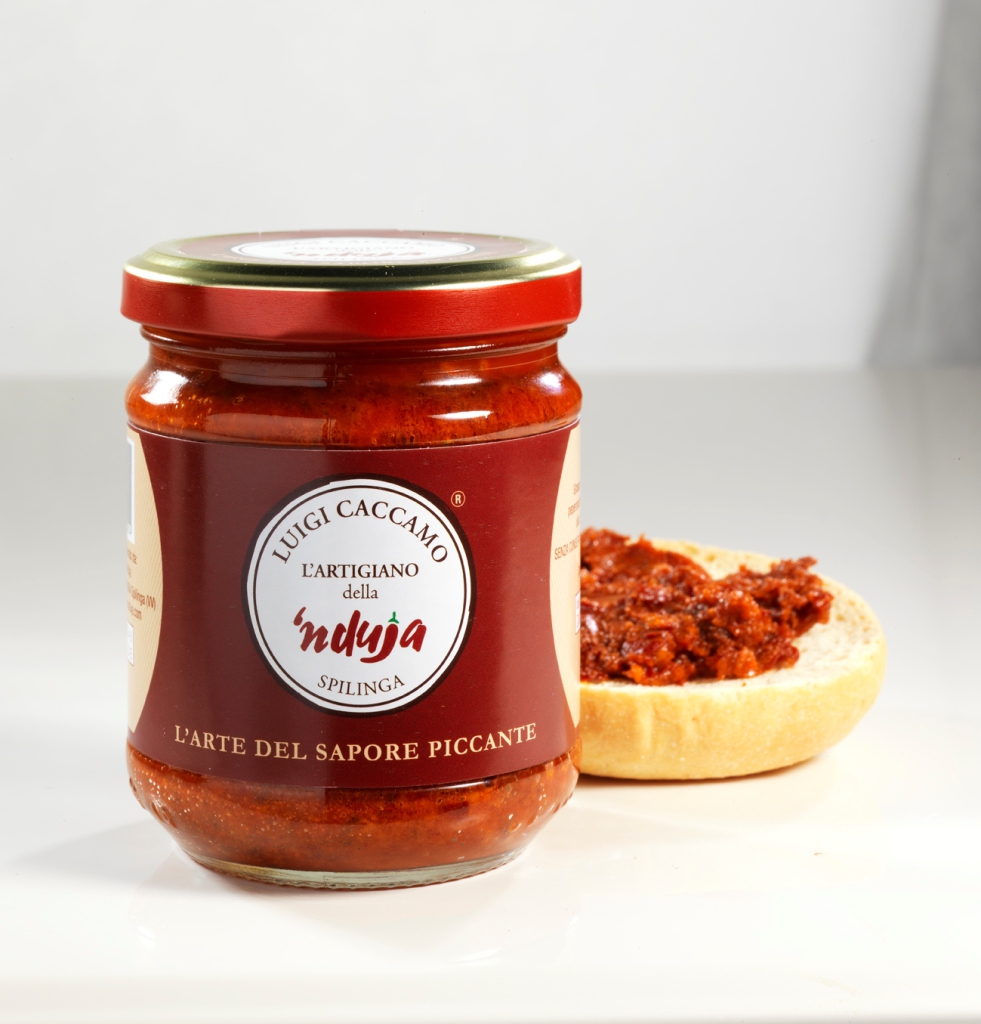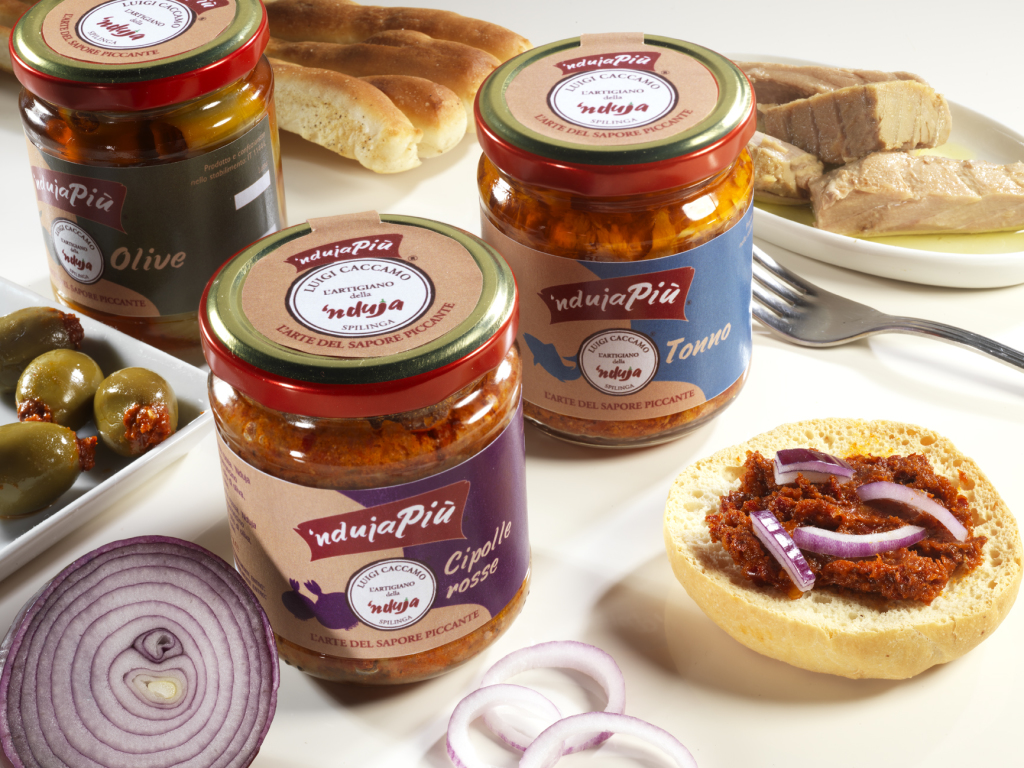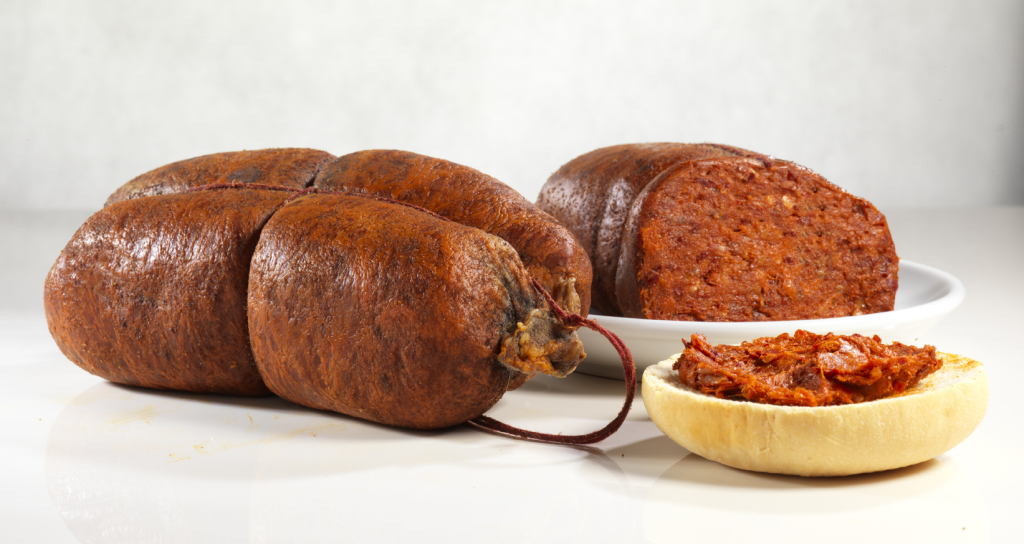 Among the ‘strong’ flavours of Calabria, the ‘nduja’ links its success to the land where it was born. Its introduction in Calabria is probably due to French people during the Napoleonic period, according Viceroy’s will. Joachim Murat was Viceroy in Naples and, at the time when he stayed in the castle of Pizzo Calabro, ordered that this sausage was prepared, in order to ingratiate himself with the Mighty of his time. To this sausage the name ‘'nduja’ was assigned. This term was borrowed and adapted to the French word ‘andouille’, which means ‘sausage’. However, some people believe that, as early as during the Sixteenth century, Spanish people imported it, alongside with hot pepper, as in Spain a similar product, known as ‘sovresada de Mallorca’, already existed.
Among the ‘strong’ flavours of Calabria, the ‘nduja’ links its success to the land where it was born. Its introduction in Calabria is probably due to French people during the Napoleonic period, according Viceroy’s will. Joachim Murat was Viceroy in Naples and, at the time when he stayed in the castle of Pizzo Calabro, ordered that this sausage was prepared, in order to ingratiate himself with the Mighty of his time. To this sausage the name ‘'nduja’ was assigned. This term was borrowed and adapted to the French word ‘andouille’, which means ‘sausage’. However, some people believe that, as early as during the Sixteenth century, Spanish people imported it, alongside with hot pepper, as in Spain a similar product, known as ‘sovresada de Mallorca’, already existed.
The geographical area in which this product reaches levels of sublime deliciousness is Spilinga, a town on the Tyrrhenian coast of Calabria, on a hill at the foot of Monte Poro.
It was a poor food, born from the need the farmers had of using the pork meat which remained after giving to their landowners the most valuable parts of the animal. In the past, 'nduja became popular, in addition to its nutritional value, for its therapeutic properties, thanks to the abundant presence of hot pepper mixed with meat.
This sausage is produced with fat parts of pork (lard, lard from the pig’s cheek, and bacon), with the addition of hot pepper and salt, smoked and naturally seasoned, after letting ‘rest’ the mixture. It enjoys an important success beyond national borders because it is different from ‘classic’ sausages, as it must be spread instead of being sliced, and can be tasted as an appetizer, spread on bread or toast, and is used in order to flavour some typical first courses of Calabria, such as ‘fileja’ or beans with ‘nduja. During the preparation of this product, hot pepper, mixed and worked with meat, plays a considerable role. There are two varieties of ‘nduja: the first one shows an elongated shape, red colour, and spicy flavour; the second one has a round shape, red colour, and sweet flavour.
The Pioneer of 'nduja
Among the companies which skilfully process ‘nduja, there is ‘L’Artigiano della Nduja’, a company founded in 2002 by Luigi Caccamo, known as ‘the pioneer of 'nduja'. This is a single-product company, which operates in compliance with its values, vision, and mission, that consists in «guaranteeing the authenticity of 'nduja of Spilinga and, therefore, producing according to tradition, understood as the transmission of knowledge over time, meeting customer-consumer’s requirements, by offering natural products without neglecting the quality of the service and, at the same time, meeting suppliers’ requirements through the optimization of raw materials», as the owner explains.
L’Arttigiano produces quality and excellence, and so it exports this delicious sausage to Great Britain, Germany, Lithuania, Netherlands, Norway, and the more distant China.
Meetings of taste
The line of specialities ‘'ndujaPiù’ is valuable and creative. Caccamo explains: «It marks an important milestone for our company’s growth, with 'Its Excellency’ 'nduja, which combines the most important foods of Italian tradition: onion, tuna, olives, for enhancing its expressiveness and scents».
 The version with red onions is a speciality born from the meeting between the two ‘queens’ of Calabria, the red onion of Tropea and the 'nduja of Spilinga. It can be tasted as an appetizer on garlic bread, for seasoning first courses, or as a base for sauces and for flavouring second courses, prepared with both meat and fish.
The version with red onions is a speciality born from the meeting between the two ‘queens’ of Calabria, the red onion of Tropea and the 'nduja of Spilinga. It can be tasted as an appetizer on garlic bread, for seasoning first courses, or as a base for sauces and for flavouring second courses, prepared with both meat and fish.
‘Nduja with tuna is prepared with yellow fish tuna, expertly blended with 'nduja, so creating a course ready to be used as an appetizer or a seasoning for pasta. ‘Nduja with olives is prepared with ‘colossal’ olives, pitted, produced in Puglia, ‘magically’ filled with 'nduja, especially suitable as appetizers and aperitifs.
All the products proposed by this company are quality certified according ISO 22000:205. This happens for ‘Orba’ too, which literally means 'blind of pig', which represents 'nduja par excellence: it is a natural bowel whose weight ranges between 1 and 3 kilograms and subjected to a seasoning which can reach 180 days. Already in the past, offering to one’s guests a ‘Orba’ meant depriving oneself of the most ‘valuable’ product that there was in the house. Today, this product is mainly assigned to delicatessens, catering, and 'fans' of 'nduja. Its considerable weight, slow and long ageing, which are intrinsic peculiarities of ‘Orba’, give this product a creaminess and intensity of fragrance that make it superior from a qualitative viewpoint.  Because of this, the company has included among its formats ‘la fetta’ (the slice), in order to offer to all its esteemers the opportunity of appreciating this speciality; the more recent 'Crespone', whose size is reduced, has been introduced for limiting both quantity and ageing time, which is of about 45 days.
Because of this, the company has included among its formats ‘la fetta’ (the slice), in order to offer to all its esteemers the opportunity of appreciating this speciality; the more recent 'Crespone', whose size is reduced, has been introduced for limiting both quantity and ageing time, which is of about 45 days.
Its pack is a cardboard one which contains a g 400 vacuum-packed ‘Crespone’ and a recipe book; it has a new packaging, which refers to the close relationship between 'nduja and hot pepper. ‘Vasetto’ (jar) is the name of the homonymous line available in jars of various sizes. At first, 'nduja contained in them is aged in ‘orba’, and is then potted with the addition of a few drops of olive oil and pasteurized.
